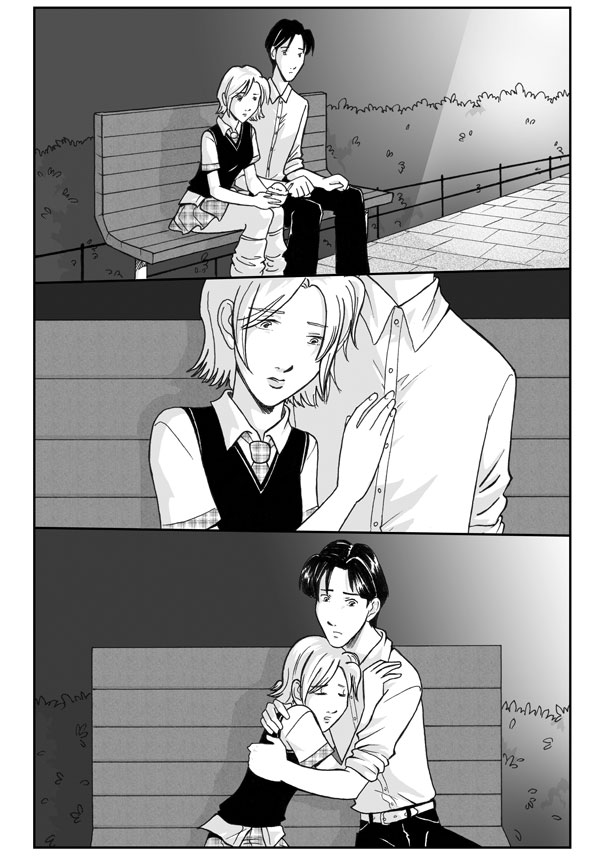 Gina Biggs has been creating comics for over seven years. She first started Red String on her own website, Strawberry Comics, before bringing her series to Dark Horse. We recently had the opportunity to ask the creator about her series and why love is the most powerful emotion in humanity.
Gina Biggs has been creating comics for over seven years. She first started Red String on her own website, Strawberry Comics, before bringing her series to Dark Horse. We recently had the opportunity to ask the creator about her series and why love is the most powerful emotion in humanity. Dark Horse: You chose to have Red String focus on the many complicated issues of love. Why?
Gina Biggs: I chose this path because love is so complicated. Love isn't easy and that makes it intriguing and inspiring to write. Love drives us to go further than we could imagine ourselves going. It's the force that keeps us connected and allows us to experience such happiness and sorrow.
DH: You've also decided to create stories that deal with love in all forms, but have you encountered any complaints from your readers because of some of these issues?
GB: Sure, there have been the occasional concerned e-mails, but no real complaints and for the most part I've been lucky enough to have a readership with an open mind and willingness to accept all forms of love in their hearts. I was overwhelmed by the support I received for the Maya and Fuuko storyline from volume two. I was flooded by e-mails from people who shared similar experiences or who had at one time in their lives been just as confused.
DH: What is it about the Japanese style and manga format you, as an American, found so appealing?
GB: It was my first experience with romance in comics as well as my awakening to the idea that women created comics, so it had a major impact on me. I had always written my own little comic stories as a kid, but it kind of opened me up to the idea that I could actually do it for real. The art style of shoujo manga was so very different from the Conan and X-Men comics I had read through my early teen years. It was softer, and yet so much more penetrating emotionally. The stories had beginnings and endings, whereas X-Men and Conan will probably go on forever. One of the bittersweet aspects of a good series is that it ends.
DH: What is one of the most interesting things you've learned about Japanese culture since starting this series?
GB: That's tough to pinpoint, since I have learned so much. I think if I had to choose one thing it would be the amazing nuances of language and body language in Japanese society. It's so easy to make a social flub and it's important to stay on your guard with what you say. For instance, if you tell someone you really like their bracelet or hairpin, you're not just giving them a compliment, you're actually implying that you want it and the other person will feel obliged to offer it to you. So much pressure!
DH: Why did you decide to release Red String as a webcomic instead of through a traditional publisher at first?
GB: Ah, that's a fairly easy answer: lack of money. I wish it was more complex than that, but I had learned the hard way with my first self-published comic series that there's a lot more to making comics than just drawing them. If you're printing the traditional way, you need money not only for supplies, but also for printing, marketing, and distributing your story. It's expensive and for someone just starting up, it's a financial drain. When I discovered that webcomics weren't all gag-a-day computer gamer stories I became interested in the idea. I could save some money by posting online and building up my audience there. Then if there was enough interest, I would look into traditional methods as a bonus. Luckily, it's worked out [laughs].
DH: How do you feel about the role of women, as creators and characters, in comics today?
GB: I don't quite know how it is with the "big two" in the industry these days, but with the other publishers and indie comics I read, I think women both as creators and characters do fairly well. There's way less refrigerators.

DH: What do you hope readers will get out of reading Red String?
GB: I really hope if they get something out of reading Red String, that it will be the understanding that they are not alone. When they cheer or cry for the characters, when they feel the connection as a character goes through something particularly hard or happy, they know their own feelings are natural. No matter what, love is never a bad thing. More than anything else I hope they will get a sense of how important love is in relation to their connection with the world.
DH: Where do you see the series going as the story continues?
GB: I'd say the series will be jumping into emotional high gear as the series continues. There are a number of trials on the horizon for the Red String bunch and I'd say Miharu and the others all have paths ahead of them that will force them into some hard choices and test the strength of their hearts.
DH: If Miharu Ogawa were real, what would be the best way to win her affection if you happened to be a struggling comic fan with only $20 to spend on a date?
GB: Well, honesty will get you a long way with Miharu. That, and a tasty banana split.
DH: Do you have any advice for all the love-struck people in the world?
GB: Love and kindness will heal more wounds and better more lives than war and hatred. Just keep spreading the love.